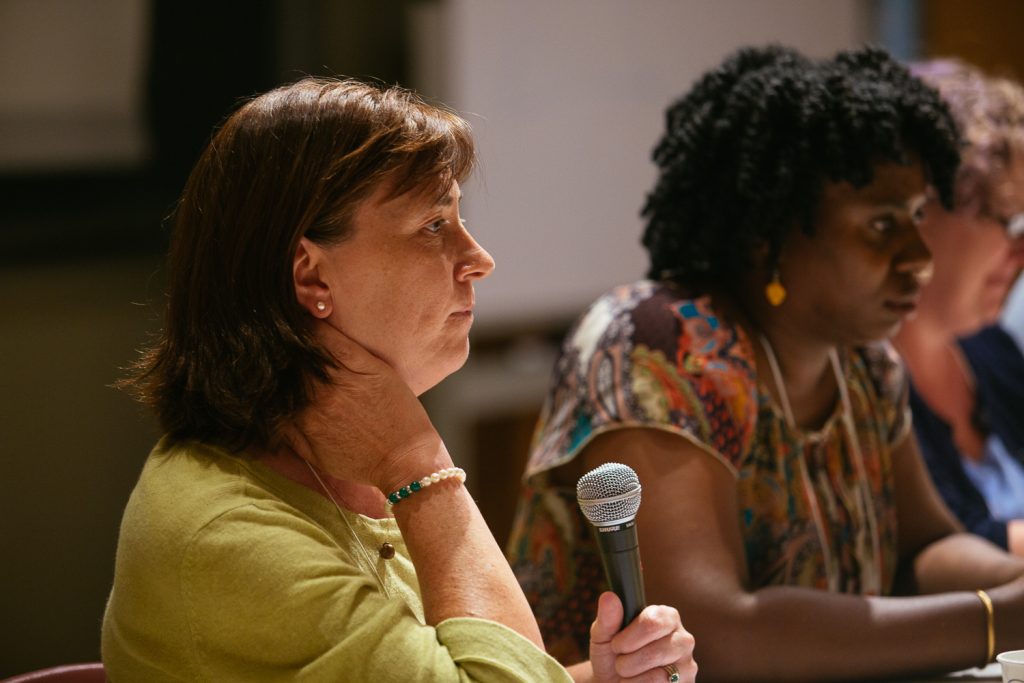Most educators know that a two-hour workshop or half-day training in restorative justice merely scratches the surface. For working professionals seeking a more solid foundation, Eastern Mennonite University offers a five-course graduate certificate in restorative justice in education, or RJE.
The first cohort of 12 education professionals from Waynesboro, Staunton and Harrisonburg — teachers, counselors, principals and others — recently completed the requirements for the graduate certificate in RJE.
The certificate’s curriculum overlaps with the university’s master’s degree in restorative justice in education program — the first of its kind in the nation — so that participants can continue their studies if desired. RJE is a growing movement that addresses educational inequities by offering students, teachers, administrators and parents an alternative to punitive discipline and by creating classroom cultures that focus on nurturing healthy relationships, justice, and equity.

Learning more about restorative justice has changed the way that Christina Norment, a counselor at Harrisonburg High School, communicates with students, faculty, and even her family.
“People don’t develop character through listening to a lecture,” said Norment. “We develop character in the context of ongoing, dynamic relationships. RJ practices create the context needed for healthy, productive communication between people, even when they are in conflict.”
This coursework has been “invaluable,” wrote Dr. Lynn Rogers, school psychologist for Staunton City Schools in an email. “The framework, theory, and research supporting RJE were covered, along with opportunities to practice skills in role plays (circles, mediations, restorative circles), develop my own understanding of how RJE could look in my school system, hear how other educators are implementing RJE and the challenges they face, and have difficult conversations in safe places about challenges that face our school systems. In addition, I have learned new ways of ‘looking at situations’ that focus on the values of RJE, such as building relationships, promoting inclusion, practicing good communication and working towards positive conflict transformation.”
The cohort also included:
- Kim Bollinger, special education teacher, Waterman Elementary School, Harrisonburg City Schools;
- Michael Eye, vice principal, Harrisonburg High School;
- Gina Gaines, art teacher at Genesis Alternative Education Program;
- Angela Hankinson, instructional aide, Waynesboro City Schools;
- Jen Morris, principal, Shelburne Middle School, Staunton City Schools
- Lea Murray, science teacher, Kate Collins Middle School, Waynesboro City Schools;
- Victoria Selmer, math teacher, Kate Collins Middle School, Waynesboro City Schools
- David Ward, student assistance counselor, Harrisonburg High School;
- Amy Werner, home-school liaison, Thomas Harrison Middle School, Harrisonburg City Schools.
- Jelisa Wolfe, executive director of student services, Staunton City Schools.
One goal of the graduate certificate program was to create and support “a sustainable model of professional development around restorative justice that more effectively equips educators to be a part of cultural shifts in their schools,” said Professor Kathy Evans, who has led the development of the RJE graduate degree and certificate programs. “Too many times, educators are provided with only surface-level training in restorative practices; their understanding is cursory and efforts to initiate RJE practices just don’t work.”
The program’s five courses address essential elements of the application of restorative justice as applied to educational settings: foundations of RJE, restorative discipline, peacebuilding and conflict transformation, facilitating circle processes, and an elective.
The curriculum provides a cohesive and comprehensive foundation of practice and theory, said Evans.
The partnership between EMU and local schools and districts is paramount to the implementation of successful RJE initiatives, says Evans. “EMU’s educational community is attentive to the expressed needs of local districts and nimble enough to bend in ways that address those needs. It has been rewarding to both teach and learn from those educators enrolled in the RJE program.”
The third cohort, which has a waiting list, begins in the fall of 2017.
EMU also offers an MA in education with a concentration in RJE, as well as an MA in restorative justice, which provides training in other settings besides education.
